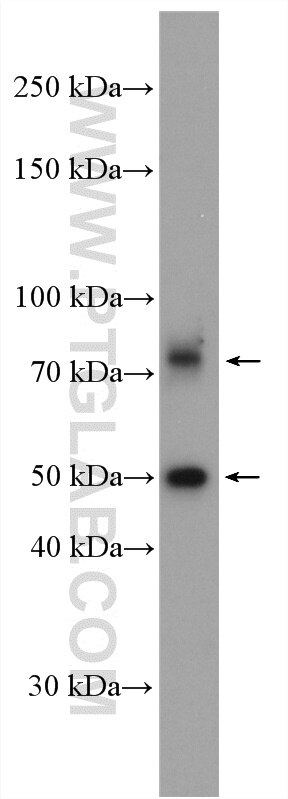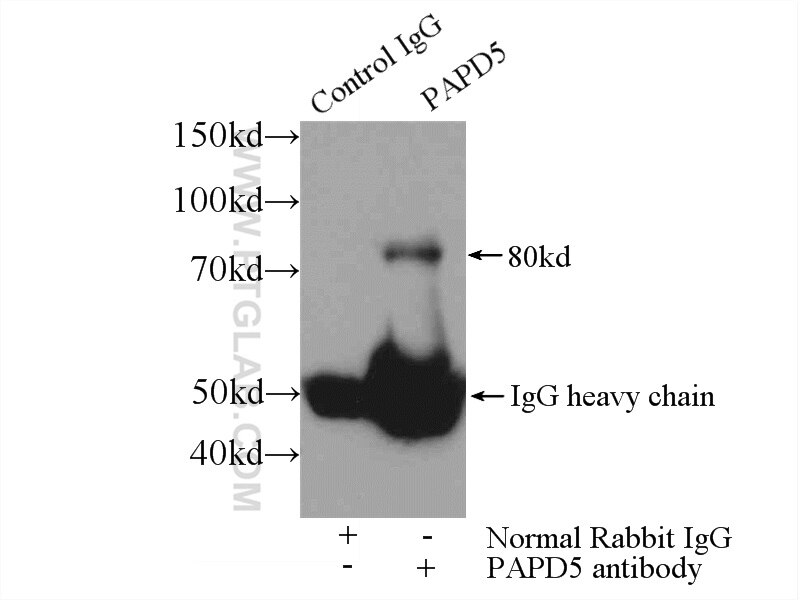- Featured Product
- KD/KO Validated
PAPD5 Polyklonaler Antikörper
PAPD5 Polyklonal Antikörper für IP, WB, ELISA
Wirt / Isotyp
Kaninchen / IgG
Getestete Reaktivität
human, Maus, Ratte
Anwendung
WB, IP, ELISA
Konjugation
Unkonjugiert
Kat-Nr. : 55197-1-AP
Synonyme
Galerie der Validierungsdaten
Geprüfte Anwendungen
| Erfolgreiche Detektion in WB | HepG2-Zellen |
| Erfolgreiche IP | Jurkat-Zellen |
Empfohlene Verdünnung
| Anwendung | Verdünnung |
|---|---|
| Western Blot (WB) | WB : 1:500-1:1000 |
| Immunpräzipitation (IP) | IP : 0.5-4.0 ug for 1.0-3.0 mg of total protein lysate |
| It is recommended that this reagent should be titrated in each testing system to obtain optimal results. | |
| Sample-dependent, check data in validation data gallery | |
Veröffentlichte Anwendungen
| KD/KO | See 1 publications below |
| WB | See 1 publications below |
Produktinformation
55197-1-AP bindet in WB, IP, ELISA PAPD5 und zeigt Reaktivität mit human, Maus, Ratten
| Getestete Reaktivität | human, Maus, Ratte |
| In Publikationen genannte Reaktivität | human |
| Wirt / Isotyp | Kaninchen / IgG |
| Klonalität | Polyklonal |
| Typ | Antikörper |
| Immunogen | Peptid |
| Vollständiger Name | PAP associated domain containing 5 |
| Berechnetes Molekulargewicht | 64 kDa |
| Beobachtetes Molekulargewicht | 63-80 kDa |
| GenBank-Zugangsnummer | NM_001040285 |
| Gene symbol | PAPD5 |
| Gene ID (NCBI) | 64282 |
| Konjugation | Unkonjugiert |
| Form | Liquid |
| Reinigungsmethode | Antigen-Affinitätsreinigung |
| Lagerungspuffer | PBS mit 0.02% Natriumazid und 50% Glycerin pH 7.3. |
| Lagerungsbedingungen | Bei -20°C lagern. Nach dem Versand ein Jahr lang stabil Aliquotieren ist bei -20oC Lagerung nicht notwendig. 20ul Größen enthalten 0,1% BSA. |
Hintergrundinformationen
PAPD5, also named as Non-canonical poly(A) RNA polymerase PAPD5, is a 572 amino acid protein, which contains 1 PAP-associated domain and belongs to the DNA polymerase type-B-like family. PAPD5 is predominantly expressed in the cytoplasm. PAPD5 as catalytic subunit of a TRAMP-like complex that has a poly(A) RNA polymerase activity and is involved in a post-transcriptional quality control mechanism. Polyadenylation with short oligo(A) tails is required for the degradative activity of the exosome on several of its nuclear RNA substrates. PAPD5 plays a role in replication-dependent histone mRNA degradation, probably through terminal uridylation of mature histone mRNAs. PAPD5 also may play a role in sister chromatid cohesion. The calculated molecular weight of PAPD5 is a 63 kDa, but the post-modified protein is about 70-80 kDa. PAPD5 exists some isoform with the molecular weight about 50 kDa and 70-80 kDa.
Protokolle
| Produktspezifische Protokolle | |
|---|---|
| WB protocol for PAPD5 antibody 55197-1-AP | Protokoll herunterladen |
| IP protocol for PAPD5 antibody 55197-1-AP | Protokoll herunterladen |
| Standard-Protokolle | |
|---|---|
| Klicken Sie hier, um unsere Standardprotokolle anzuzeigen |
Publikationen
| Species | Application | Title |
|---|---|---|
Nucleic Acids Res mRNAs are sorted for export or degradation before passing through nuclear speckles.
|



